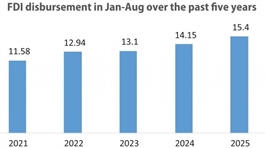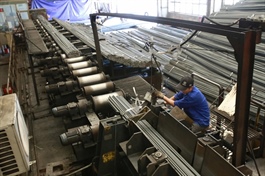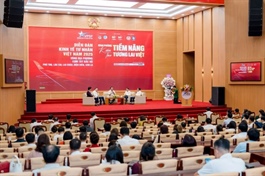Changes proposed to investment approval procedures
Changes proposed to investment approval procedures
Under the proposal, approval procedures will be simplified and only apply to projects with significant environmental impact, those affecting national defence and security, or projects in sensitive sectors such as airports and seaports.

Civil servants process administrative procedures at Ninh Bình Province’s one-stop Public Administration Service Centre. — VNA/VNS Photo Văn Đạt |
The Ministry of Finance has proposed major changes to procedures for approving investment policies in its draft Law on Investment, which is set to replace the current law.
The draft has attracted wide attention from the business community.
Under the proposal, approval procedures will be simplified and only apply to projects with significant environmental impact, those affecting national defence and security, or projects in sensitive sectors such as airports and seaports.
The draft also clarifies cases where approval will not be required. These include projects already identified in national or provincial master plans with clear details on name, scale, objectives, location, investor and timeline. It also covers projects where investors are selected through land auctions or bidding for land-use projects.
The aim is to ensure consistency across the legal system, cut red tape and reduce overlapping rules, according to the ministry. At the same time, the procedures still serve as a filter for sensitive projects and as a legal guarantee for investors’ rights and State commitments on incentives and policies,.
International experience shows that many countries, including the US, the UK, Australia and China, maintain similar screening mechanisms for investment projects, especially those involving foreign investment.
Supporters say the procedure helps integrate related requirements on planning, land, environment and construction into a single process, reducing time and cost compared to handling each separately. It also creates consistency across sectoral laws, prevents overlapping procedures and helps build a transparent, accessible investment environment.
The Vietnam Chamber of Commerce and Industry (VCCI) has voiced support for narrowing the scope of projects that must go through the approval process. It said the change would cut a large number of administrative steps, saving time and resources for both businesses and regulators.
Still, debate remains heated.
Critics argue the approval process is unclear, ineffective and duplicative. Others warn that removing it entirely could pose risks to State management, harm businesses and undermine the investment climate.
The draft law is still under consultation. Enterprises continue to propose further streamlining of appraisal procedures, while stressing that all changes must ensure consistency and transparency in the overall legal framework.
- 07:29 16/09/2025



























